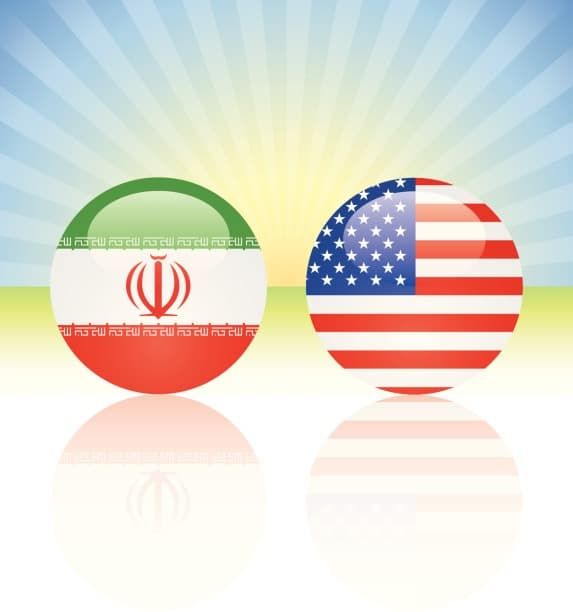Trump should stop fantasizing about killing the Iran nuclear deal
By Lawrence J. Korb | January 15, 2018

To understand President Trump’s recent decision to keep the Iranian nuclear deal alive by waiving sanctions against Iran for the third time—but saying this will be the last time he will do so, unless the deal is significantly renegotiated—requires an understanding of the history of arms control deals negotiated by the United States. Taken in context, the president’s repeated attempts to force a renegotiation of the Iran agreement can be seen as the counterproductive fantasies they have been. They should stop, as the president and Congress turn to focus on more pressing security challenges.
Before the Iranian nuclear deal of 2015, the United States had negotiated a series of deals over four decades to limit the development and deployment of nuclear weapons. But these previous arrangements were all bilateral, with either the Soviet Union or Russia on the other side, and were ratified by at least two-thirds of the Senate, in effect thus becoming treaties. Moreover, all had specific end dates. For example, the New START agreement that President Obama negotiated with the Russians in 2010 was ratified by a Senate vote of 71-26; it is due to expire in 2021.
The Iranian nuclear deal, or Joint Comprehensive Plan of Action (JCPOA), signed by President Obama in 2015, is not a treaty; neither is it bilateral. It is a multilateral agreement that reflects political commitments by the United States and five other nations (i.e. the five permanent members of the UN Security Council, plus Germany, or P5+1), three of whom are our NATO allies, to waive international sanctions against Iran if it halted its nuclear weapons development program. After trying unsuccessfully to block the agreement through a resolution of disapproval, the Congress passed and Obama reluctantly signed the Iran Nuclear Review Act of 2015. This measure not only allowed the Congress to review the agreement but imposed a requirement that the president certify every 90 days that Iran is complying with the deal or else sanctions could be reimposed.
During his campaign, President Trump, Obama’s eventual successor, not only criticized the Iran deal, calling it the worst imaginable, but also denigrated several other arms control agreements with the Soviets and Russians. In fact, according to NBC news, he told his military advisors in a July 2017 meeting that he wanted to increase the size of the US nuclear arsenal to its Cold War peak of 30,000 nuclear weapons, from the current New START limit of 1,550 deployed nuclear weapons. Moreover, Trump refused President Putin’s offer to extend New START from its current 2021 expiration date for five years, something that could be done without the approval of the Senate or Russian Duma.
But he has not publicly threatened to withdraw from that treaty, nor is there any political pressure on him from his supporters or congressional hawks to do so at this time. Trump has, however, repeatedly threatened to pull the United States out of the JCPOA unless it is renegotiated in some way—a renegotiation that Iran and all the other countries in the agreement have rejected.
Some of Trump’s predecessors inherited arms agreements they did not like. During his campaign against then-President Jimmy Carter, for example, President Ronald Reagan criticized SALT II, a nuclear arms control pact that the Carter administration had negotiated with the former Soviet Union. After the 1979 Soviet invasion of Afghanistan, Carter withdrew the treaty from Senate consideration. Nonetheless, after he took office in 1981, Reagan essentially abided by its terms, thus laying the groundwork for the Intermediate-range Nuclear Forces and START treaties with the Soviets—agreements that hastened the end of the Cold War.
President Trump has a real political problem in regard to the Iran nuclear deal: He must publicly certify every 90 days that the Iranians are complying with it, something that he believes they are not doing and that draws attention to his campaign promise to quickly tear up the agreement. During his first six months in office, the president reluctantly did certify Iran’s compliance with the deal twice. For the two most recent deadlines, however, he has refused to certify Iranian compliance, even though the International Atomic Energy Agency (IAEA) has offered overwhelming evidence that Iran is abiding by the agreement, and the other five nations that are part of the deal agree.
Even though he has refused to certify Iranian compliance, Trump has not taken the next step toward withdrawing from the JCPOA—snapping back the sanctions that the UN and US imposed on Iran for violating the Non-Proliferation Treaty. In October, the president kicked the ball to Congress, which did not re-impose the sanctions. On January 12, Trump waived the sanctions once again. But the president said he would not agree to another waiver unless the agreement is amended to permanently block Iran from a potential path to build nuclear weapons.
Trump and his supporters contend that he cannot continue to certify the deal in its present form for three reasons: First, the agreement is not permanent. After 15 years, Iran will be allowed to begin enriching uranium so it contains more of the fissionable isotope uranium 235 than is required for commercial power production. (Low-enriched uranium used in most power plants contains from 3 to 5 percent uranium 235; 90 percent enrichment is a level appropriate to nuclear weapons.) Second, Iran is testing ballistic missiles and supporting terrorist groups throughout the Middle East. And third, they complain, the IAEA should be allowed to inspect any military site in Iran, even without reasonable evidence that nuclear activity had occurred there.
Actually, none of these reasons justifies withdrawing from the JCPOA. First, most arms control agreements have expiration dates. As mentioned above, New START expires in 2021. The enrichment portion of the JCPOA does sunset after 15 years—but the agreement’s prohibition against Iran developing nuclear weapons is permanent.
The second complaint about the JCPOA is similarly fact-challenged: The JCPOA deals only with Iran’s nuclear program, not its ballistic missile or other military efforts. The United States historically has not linked outside concerns to continuation of arms control treaties: President Carter, for instance, did not abrogate the SALT and the Anti-Ballistic Missile Treaty, both signed during the Nixon administration, even though the Soviet Union invaded Afghanistan during Carter’s tenure.
Third, as with most arms control agreements, the inspection regime set out in the JCPOA does not allow the IAEA to inspect just any military base without reason. In fact, the agreement sets out a process for dealing with inspection disputes. If the IAEA requests to inspect a military site and Iran refuses, the issue is referred to an independent commission that would examine the evidence supporting the inspection request. (A concrete example points up just how weak Trump’s inspection argument is: Imagine how the United States would react if Russia said it wanted to inspect Joint Base Andrews near Washington, DC, as part of New START, even though there is no evidence that Andrews ever had nuclear weapons.)
If Trump had chosen to reimpose sanctions against Iran last week, it would have given the United States the worst of all possible worlds. The Iranian government could have blamed the United States for the Iranian economic problems that have led to recent mass demonstrations in that country—problems that would be much worse had it not been for the deal. Moreover, our European allies (not to mention Russia and China, which also signed the JCPOA) have indicated they would refuse to snap back sanctions in parallel with the United States, leaving those countries to capitalize on economic opportunities with Iran that US companies could no longer pursue.
When Congress passed and President Obama reluctantly signed the Iran Nuclear Review Act, no one could have envisioned that Trump would succeed Obama. A President Clinton, Sanders, Bush, or Kasich (or other traditional Republican candidate) would likely not have felt hemmed in by the 90-day certification process, regardless of their campaign promises. But Trump’s own simplistic rhetoric on the Iran nuclear deal has put him in a corner.
There is a reasonable answer to the president’s political dilemma: The administration and its Republican congressional supporters can continue to place targeted sanctions on those Iranian individuals and groups who are responsible for Iranian ballistic missile tests, for support for organizations like Hezbollah or Hamas, and for human rights abuses. And the Republican-led Congress can eliminate the politically problematic (for Trump) 90-day certification requirement and rely on the IAEA to ensure that Iran is in compliance with the deal.
Obviously, if Iran should actually violate the nuclear deal, the P5+1 can and should reimpose the UN sanctions on Iran. But until and unless international inspectors find evidence of a violation, the president and Congress need to recognize that any prospect of renegotiating the Iran nuclear deal is pure fantasy and to turn their focus to other, more pressing security challenges.
Together, we make the world safer.
The Bulletin elevates expert voices above the noise. But as an independent nonprofit organization, our operations depend on the support of readers like you. Help us continue to deliver quality journalism that holds leaders accountable. Your support of our work at any level is important. In return, we promise our coverage will be understandable, influential, vigilant, solution-oriented, and fair-minded. Together we can make a difference.
Topics: Nuclear Energy, Nuclear Weapons, Opinion














